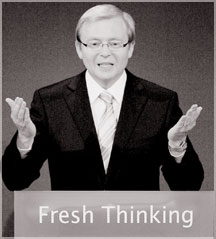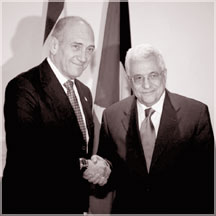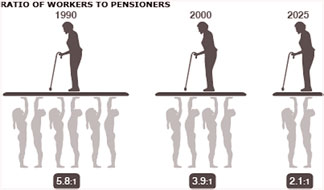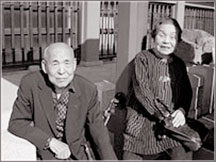 Australia shifts course, away from US
by Paul Reynolds
Australia's incoming Prime Minister Kevin Rudd will steer a course
that puts some distance between Australia and the United States under
President George W Bush.
Mr Rudd's two major foreign policy initiatives will both highlight
differences with the Bush administration.
Firstly, the new Australian leader will sign the Kyoto Protocol on
climate change. Perhaps more importantly, given that Kyoto has to be
followed by a new agreement, he will himself go to the meeting in Bali
next month that will launch negotiations for a post-Kyoto plan.
Secondly, Mr Rudd is expected to withdraw the 550 Australian combat
troops from Iraq.
Mr Bush lost the last of his big supporters in the war on Iraq when
John Howard went down to a landslide defeat, joining the former Spanish
and British Prime Ministers Jose Maria Aznar and Tony Blair.
End of era
It is the end of an era as far as Iraq policy goes, with American
allies keen to get out and the United States itself looking for a
solution that will enable it to reduce its troop levels significantly.

However, in another area of combat, Afghanistan, there have been
suggestions that the new Australian government might even increase the
numbers of its troops there from the current level of about 1,000.
Australian special forces are in a frontline role and a commando was
killed on the eve of the election, the third Australian death in recent
weeks.
Many Western governments have drawn a distinction between sending
troops to Afghanistan and sending them to or keeping them in Iraq. They
regard Afghanistan as an allied operation with a clear objective - to
prevent the Taleban from returning to power in a country where it
allowed al-Qaeda the freedom to plan its attacks.
Global warming
The new Australian policy on global warming will present Mr Rudd with
some policy difficulties. Australia is a major per capita producer of
greenhouse gases, and exports coal to China.
China itself is building coal-fired power stations and, according to
the British Foreign Office's climate change ambassador, John Ashton, a
reduction in China's pollution output is one of the main targets in the
climate control campaign.
Mr Rudd himself said about his attendance in Bali: "It would be a way
of indicating... that we intend to be globally, diplomatically active."
His own ability to speak Mandarin, learned when he was a diplomat,
will perhaps help in persuading the Chinese leadership of the merits of
the climate change case.
But China's problems in meeting its energy demand (fuelled partly by
a worldwide demand for its products) - and its need to feed a billion
mouths a day - has driven its policy of buying up worldwide resources
and it is hard to see this changing.
India and uranium
One area of policy that could lead Mr Rudd into diplomatic conflict
is the supply of uranium to India.
The government of John Howard agreed earlier this year to change its
policy of not supplying India, which is outside the Nuclear
Non-Proliferation Treaty and which has built its own nuclear weapons.
Mr Rudd is expected to go back to the policy of refusing to sell
uranium to any country not in the NPT.
This in itself might conflict with Australia's new commitment to
control global warming, as nuclear power is one way of reducing
greenhouse gases.
Apology
Another signal about Australia's intention to change its policies is
that Mr Rudd is likely to make a formal apology to the country's
indigenous people, the Aborigines. This is something that Mr Howard
refused to do.
And it is likely to reinforce those campaigns around the world that
want apologies for other colonial and historic policies.
BBC
New Mid-East peace drive launched
Israeli and Palestinian leaders have agreed to start talks aimed at
reaching a full peace deal by the end of 2008.
Opening a Middle East peace conference, US President George W Bush
said all outstanding issues dividing the two sides would be on the
table.

Palestinian Authority President Mahmoud Abbas said the talks must
include the status of Jerusalem as a Palestinian capital, and the future
of refugees.
Israeli PM Ehud Olmert said Israel was prepared to make compromises
for peace. Standing before the diplomats from more than 40 countries and
international agencies at the US naval academy at Annapolis, Maryland,
President Bush stepped back to allow the Palestinian and Israeli leaders
to shake hands.
"We agree to engage in vigorous, ongoing and continuous negotiations
and shall make every effort to conclude an agreement before the end of
2008," Mr Bush said, reading from a statement agreed by the two sides.
He said the first negotiations would start on 12 December, with
further meetings to be held every two weeks after that.
He committed himself to spending the rest of his presidency - until
January 2009 - working towards "an independent democratic viable
Palestinian state".
"Such a state will provide Palestinians with the chance to lead lives
of freedom, purpose and dignity," Mr Bush said.
"And such a state will help provide Israelis with something they have
been seeking for generations: to live in peace with their neighbours."
Mr Abbas followed with his own speech, saying: "We have to start
comprehensive and deep negotiations on all issues of final status,
including Jerusalem, refugees, borders, settlements, water and security
and others".
He said East Jerusalem should be the capital of the new Palestinian
state, something deeply opposed by many Israelis who regard it as part
of their own capital. Mr Olmert said he had come to Annapolis despite
the obstacles posed by continuing violence against the people of Israel.
But he added that the "time has come... we want peace".
Mr Olmert agreed that all the core issues dividing the two sides
would be on the table, and that Israel would assist Palestinian refugees
find a future in the new Palestinian state.
Following the speeches, the delegates at Annapolis broke into
sessions for further discussions.
In a closing news conference, a tired-looking US Secretary of State
Condoleezza Rice said the event had demonstrated "unambiguously" that
the new initiative had international support.
"No one believes failure is an option," she said.
Ms Rice is reported to have made 36 phone calls to world leaders over
last weekend as part of efforts to achieve results at the conference.
Nations will be asked to provide financial support for Palestinian
aid programmes at a donors' conference in Paris in mid-December.
Observers say the fact that the summit is being hosted by the US and
has attracted the participation of Saudi Arabia and Syria, two Arab
states that do not recognise Israel, is critical to its chances for
success.
But expectations going into Annapolis have been low because every
other attempt at negotiation between the Israelis and the Palestinians
has failed, says the BBC's Jeremy Bowen at the conference.
However, there are grounds for optimism, says our correspondent: the
Americans are behind the talks, there is no plan B and the consequences
of failure could be bloody.
The absence of Palestinian faction Hamas, which is designated a
terrorist organisation by the US, the EU and Israel, could also make
negotiating a deal problematic.
Hamas controls the internal affairs of the Gaza Strip and says it
will not be bound by anything decided in Annapolis.
In Gaza on Tuesday tens of thousands of people joined a rally
protesting against the talks, many of them chanting "Abbas is a traitor"
and "We will not recognise Israel".
And in the West Bank, controlled by Mr Abbas's Fatah faction,
Palestinian security forces broke up several protests against the
Annapolis gathering. One man was killed in Hebron, Palestinian medical
officials said.
In Jerusalem, Israelis gathered at the Western Wall on Monday to
protest against the conference.
Israeli opposition leader Benjamin Netanyahu labelled the meeting "a
continuation of one-sided concessions".
The wider tensions in the Middle East are also a concern, with many
fearing that problems with Iraq, Iran and Lebanon could derail any peace
process, our correspondent says.
Mr Abbas and Mr Olmert have said say they are ready and willing to
negotiate, our correspondent says - the question is, whether events and
some of their own people will let them.
BBC
'Hillary can put us back on track'
MUSCATINE, Iowa - Hillary Rodham Clinton will bring America "back to
the future," husband Bill says, promoting his own legacy in public life
almost as much as his wife's presidential campaign.

Showing inconsistency on an issue that has dogged his wife, the
former president also told Iowa Democrats that he "opposed (war in) Iraq
from the beginning."
His visit to Iowa marked the start of a battle of campaign surrogates
- Clinton vs. Winfrey, the former president stumping for his wife and
media mogul Oprah Winfrey backing Sen. Clinton's chief rival, Barack
Obama, in appearances scheduled for next week.
"Oprah vs. Bill! Now, there's a race," said Gail VanGundy, 59, an
undecided voter who said the former president is a bigger draw for her
than Winfrey.
"Both have star power," said Alfred Monroe, 76, as he awaited the
former president's appearance in this eastern Iowa town.
Clinton himself said Winfrey ought to be for Obama because both hail
from Chicago. He didn't mention that his wife is also from suburban
Chicago. "I like Oprah Winfrey," he said. "We're friends."
Whether surrogates like Clinton and Winfrey sway voters is debatable,
but operatives in both campaigns welcome their ability to draw crowds
and attention in the closing days of a hotly contested race.
Speaking for more than an hour, Clinton discussed his wife's agenda
and experience in exhaustive terms, sprinkling the remarks with asides
about his presidency and his activities on the world stage since he left
office in January 2001.
"I think she has proven in all these debates, and especially the last
one, that she is the strongest, most reliable person that we could
elect," the former president told more than 400 potential voters at a
YMCA gym.
On Iraq, he told the crowd that wealthy people like he and his wife
should pay more taxes in times of war. "Even though I approved of
Afghanistan and opposed Iraq from the beginning, I still resent that I
was not asked or given the opportunity to support those soldiers,"
Clinton said.
He has not clearly opposed the war from the start. Like his wife, the
former president has been critical of the Iraq war in recent months, but
at one time he gave President Bush the benefit of the doubt. "I
supported the president when he asked for authority to stand up against
weapons of mass destruction in Iraq," he said in May 2003, the same year
he was quoted praising Bush's handling of the war.
Asked about the discrepancy, Clinton aides said Tuesday's comment was
a short-handed explanation of his long-held views that weapons
inspectors should have been given more time in Iraq. "As he said before
the war and many times since, President Clinton disagreed with taking
the country to war without allowing the weapons inspectors to finish
their jobs," said spokesman Jay Carson.
In three eastern Iowa stops, Clinton made a personal appeal for
voters to back his wife. He said his opinion should matter because "I
know what it takes to be president" and "because of the life I've lived
since I left office."
He seemed to suggest that the nation needs a return to 1990s
sensibilities.
"Here's why I think that she is the person to bring us the right kind
of change that we need. First of all, what kind of change do we need? We
need to get American back to the future. We need to get America back to
the solutions business."
AP
How to fund Japan's ageing society
In the last of a series on Japan's population crisis, the BBC's
Philippa Fogarty looks at how Japan plans to pay for its ageing society.
Every weekend, Mr Momonoki and his wife try to make the walk to
Tokyo's Asakusa Kannon shrine.

The couple, who have been married for more than 60 years, are calm
about the future.
"I'm not very well and I have to see the doctor quite often, but the
state pays for everything," said Mr Momonoki, 86. "While I am around,
the state will take care of us."
But the problems will hit the next generation. "It is certainly a
worry for younger people," he said.
Yes indeed. In the next few decades, Japan's ratio of workers to
retirees will change dramatically.
In 1990, there were almost six people of working age for each
retiree. By 2025, that number will be almost down to two.
That means there will be fewer people paying tax and more people
supported by the state. Government revenue will fall, while pension and
health care costs will climb.
How Japan meets these costs is a serious issue. Some fear a collapse
of the social security safety net could be imminent.
Tax hike
The government has already taken several steps to address the
problem. Recent administrations have worked to slash spending. Public
works projects have been cut, the bureaucracy is being trimmed and
funding to the countryside is down.
|

Mr and Mrs Momonoki say they trust the government to look
after them |
The pension system has also been targeted. Under Junichiro Koizumi,
unpopular reforms were enacted in 2004 that increased premiums and
lowered benefits.
In the health sector, a new compulsory insurance system has been set
up to meet growing demand amongst the elderly for long-term residential
care. The proportion of medical costs borne by patients - both young and
old - has also been increased.
But no-one is under the impression that this is enough.
In October a government estimate warned that, even incorporating the
reforms to date, social security payouts will soar from the current
JPY90 trillion ($820bn, œ396bn) to JPY141 trillion in 2025.
One possible answer is the consumption tax, Japan's equivalent of
value-added tax. This is currently set at 5%, low compared to most
Western countries.
Previous administrations have avoided touching the tax because it
would be an unpopular move, but rumblings from the government of Yasuo
Fukuda now indicate that a jump into double figures could be imminent.
One Tokyo retiree welcomed this idea. "If the government specified
that the money would go to cover pension and health costs, then I would
be happy with raising the consumption tax," she said.
'Better to work'
Another option is to try to persuade people to work for longer,
delaying pension payouts and using older workers to bolster the labour
force.
The government is gradually raising the age at which pensions are
paid - by 2030, everyone will have to wait until 65 - and there appears
to be no shortage of eager older workers.
|

Yamada wants to continue to work for as long as he can
|
According to a government survey, a substantial majority of Japanese
men believe that the retirement age should be 65 or higher. In 2005, 30%
of people over the age of 60 were working, a separate survey showed.
In central Tokyo, 68-year-old Mr Yamada works in a car park. "It's
better to work," he says. "As long as I have my health, I'll continue to
work - it's more interesting."
But Professor Yasushi Iwamoto of Tokyo University believes the
government is too optimistic about swelling the labour force from the
ranks of the elderly.
Older people can find employment in low-paid jobs, he said, but
getting many companies to keep salaried workers on will be difficult
because in Japan pay is often linked to age.
"The salary of senior workers is very high compared with their
productivity, so basically the companies don't want to continue to hire
them," he said.
Under new legislation, firms must either raise retirement ages or
create re-employment programmes allowing workers to remain on lower
wages - and most appear to be going for option two.
Prof Iwamoto says that there is no single answer to the funding
problem.
"The best possible way is a combination of approaches - increasing
the birth rate, trying to make the health care sector more efficient.
"One important thing is to move quickly. We expect a gradual increase
in social security costs, so if we raise tax burdens right now, we will
succeed in keeping the future burden ratio relatively low. If we delay,
the problem will get worse."
Across Japan, people are worried about how the funding issue will
affect them.
BBC
UN climate circus rolls in on CO2 cloud
IT HAS been billed as the summit that could help save the planet, but
the latest United Nations climate change conference on the paradise
island of Bali has itself become a major contributor to global warming.
Calculations suggest flying the 15,000 politicians, civil servants,
green campaigners and television crews into Indonesia will generate the
equivalent of 100,000 tonnes of extra CO2. That is similar to the entire
annual emissions of the African state of Chad.

When it was first conceived, only a few thousand politicians civil
servants and environmentalists were expected to attend the conference -
about normal for such an event.
The meeting, which runs from December 3-14, aims to create the
framework for a successor to the Kyoto treaty on reducing global
greenhouse gas emissions, which expires in 2012.
However, climate change's growing political importance has led to a
surge in interest in the conference, which is being held in the luxury
holiday resort of Nusa Dua on Bali's palm-fringed southern coast.
Attendees are expected to include celebrities such as Leonardo
DiCaprio, the actor, as well as Arnold Schwarzenegger, governor of
California, and Al Gore, the former US vice-president.
Many are merely "observers" who have no formal role to play in the
talks, which largely involve government ministers and officials. Among
these observers are 20 MEPs and 18 assistants whose itinerary includes a
daytrip to the idyllic fishing and surfing village of Serangan.
The UN has also recently received thousands of new registrations from
groups campaigning for the environment or fighting against poverty. WWF,
one of the largest, is sending more than 32 staff to the meeting.
Thousands more are coming from businesses, especially the burgeoning
carbon trading sector, which already carries out global transactions
worth œ12 billion a year and has an acute interest in the outcome of
Bali.
Indonesian officials say the final tally could reach 20,000 - and
fear it could stretch the resort's infrastructure to the limit. About
90% of the emissions will be generated by delegates flying thousands of
miles to Bali, with the rest coming from the facilities they will be
using.
Chris Goodall, a carbon emissions expert who did the calculations for
The Sunday Times, estimated that each person flying to Bali would, on
average, generate the equivalent of 6.48 tonnes of CO2. If 15,000 people
attend, this adds up to over 97,000 tonnes of CO2. To this must be added
about 13,000 tonnes of CO2 from the conference venue and hotels - a
total of 110,000 tonnes.
Goodall, author of How to Live a Low-Carbon Life, said: "One wonders
how many people would have gone if the conference had been held in a wet
October in Pittsburgh."
The preparations are acquiring the feel of a huge party, with the
Indonesian government seeing it as a chance to revive Bali as a tourist
destination after terrorist bombings in 2002 and 2005 saw visitor
numbers plummet.
Britain has tried to ensure its delegation is one of the smallest
among the leading developed nations. Three ministers - Hilary Benn, the
environment secretary, Phil Woolas, junior environment minister, and
Gareth Thomas, junior minister for international development - will
attend accompanied by about 40 civil servants.
Woolas, however, is still embarrassed by the increasing scale and
opulence of such gatherings. "It's like a circus," he said. "It's not
just Bali. There are now more than 500 environmental treaties and
conventions taking place around the world. It's a morass of Byzantine
proportions. The UN oversees world governance on these issues and we
urgently need to streamline it."
Three ministers in the British delegation are staying in œ330-a-night
suites at the Westin Resort Nusa Dua hotel, each with their own bedroom,
living room and dining room. Such apparent luxury is justified, say
aides, by their need for somewhere to hold private meetings.
One of the biggest delegations is being assembled by the European
Union, which is expected to send Stavros Dimas, the environment
commissioner, and 90 officials. In addition, all 27 EU countries are
expected to send separate national delegations.
Germany has one of the biggest, with around 70, and France follows
close behind with 50. Even Latvia will be represented by four delegates,
while Malta, an island populated by 400,000, will have two.
The emissions from Bali, although huge for such an event, remain
small on a global scale. Britain, for example, emits the equivalent of
660m tonnes of CO2 a year. Achim Steiner, director of the UN Environment
Programme, said such conferences could never be small.
"If you want to tackle an unprecedented global challenge like climate
change then people have to meet and talk. Bali remains the world's best
hope to minimise the effect of global warming."
Times |
